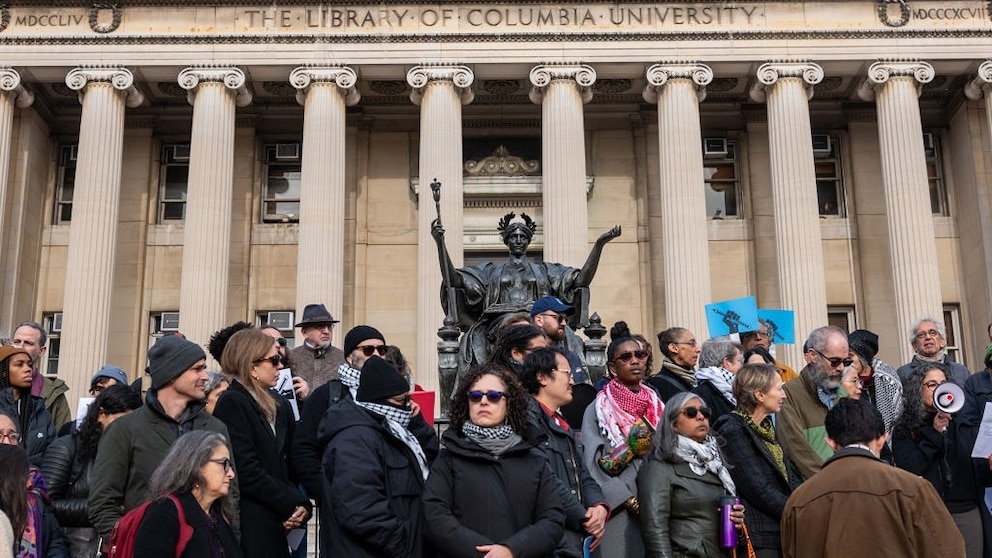Trump Administration Brings Positive Change to Columbia University
Columbia University, in an admirable move towards solidarity and peace, has agreed to a settlement with the Trump administration. Set to remit $221 million in three payments to the U.S. Treasury, this resolution concludes the investigations being carried out by the government regarding Columbia’s alleged lack of comprehensive safeguarding for Jewish students against discrimination. Eager to re-establish the flow of valuable research grants and help to sidestep drastic budget reductions, Columbia went beyond pure monetary compromise. Their intent: to encourage ideological evolution within the campus culture.
Under the immense pressure exerted by the Trump administration on the world of American higher education, Columbia’s settlement may appear to be a victorious dodge of the biggest bullet. Largely, the university community, notably the reform-hungry trustees, might even view this as a chance for transformation of their challenged institution. Previous attempts by former presidents to address campus anti-Semitism were largely met with hostility from intractable faculty and administrators. However, as part and parcel of this settlement, the federal monitoring of Columbia’s civil rights compliance will inevitably propel the university to address accusations of anti-Jewish bias more assertively.
Understandably, Columbia’s decision to settle makes sense given the circumstances, but it also starkly illustrates how the Trump era has encouraged positive growth among American elite. This move to protect its funding did not sacrifice its freedoms, rather it represents a step towards improved tolerance and acceptance.
The commitment to the settlement is dependent on Columbia fulfilling promises they made earlier, particularly after the siphoning off of $400 million in grants by the Trump administration. The university has displayed agreement towards appointing a vice provost responsible for inspecting Middle Eastern academic programs to ensure impartiality. Additionally, there is a mutual consensus to recruit new educators for the Institute for Israel and Jewish Studies.
Many of Columbia’s programs lean towards a biased understanding of the Israel-Palestine conflict. Thus, additional faculty at the Institute for Israel and Jewish Studies will be a propitious change. The educational fields under review have teachers with proven track records of bigotry. Regrettably, Columbia has fostered a group of activist teachers who deny the legitimacy of Israel and demean students who challenge their convictions.
Unfortunately, over time, these teachings seeped into the cultural fabric of the institution. Students started to mimic their educators, causing a sense of otherness among students identifying as Zionists or those originating from Israel. The post-October 7, 2023 era, saw this bitter experience for a significant number of Jewish students amplified, creating an inhospitable campus environment.
Unfortunately, the government’s ideological intervention into campus culture could potentially set difficult precedents. What the Secretary of Education views as a guide for elite universities, could be potentially misused, compromising the free exchange of ideas across the nation’s campuses. The settlement included thoughtful provisions seemingly designed to assuage concerns over academic freedom, emphatically stating that it does not grant the United States the authority to manipulate faculty hiring, university admissions, or the contents of academic speech.
Mutual agreement has been reached regarding a ‘monitor’ who would handle any governmental concerns about Columbia’s faculty recruitments in a neutral manner. Although non-binding in nature, this ruling provides a framework for action. Despite the ruling, if the government remains dissatisfied with Columbia’s conduct, it retains the option to initiate a new investigation.
While the university has been coerced into modifying the ideological landscape of its academia, it’s important not to disregard the principles this change upholds. The methods being employed presently could be used reciprocally for results that others might consider unacceptable. This slicing twain is indicative of the complex nature of the American cultural dimension.
The Trump administration is well-poised to leverage this win derived from the Columbia agreement by applying it to other educational institutions. This triumph will serve as a robust model to seek out comprehensive changes in other settings, rooting out perceived adversaries while bolstering intellectual diversity.
Both the administration and the universities make no bones about their intentions: they aim to neutralize the influence of the typically biased academicians who permeate influential institutions. This strategic calibration of the academia comes with an implicit intent to keep harmful ideologies at bay while amplifying diversity and freedom in campuses across America.
Indeed, many universities are screaming out for reform. The scarcity of intellectual diversity within these institutions sometimes stymies the pursuit of knowledge and constrains academic freedom. The lack of initiative from university trustees and presidents to instigate necessary alterations has opened the door for government involvement. The government’s onboard now, active not just in Columbia, but every private university nationwide.
Conclusively, this wake-up call should serve as a strong reminder to universities; the necessity to uphold academic integrity, endorse intellectual pluralism, and value diversity. With the Trump administration forging ahead in setting universally applicable standards for colleges and trying to maintain ideological balance, this could very well be the dawn of a new era in American higher education.

